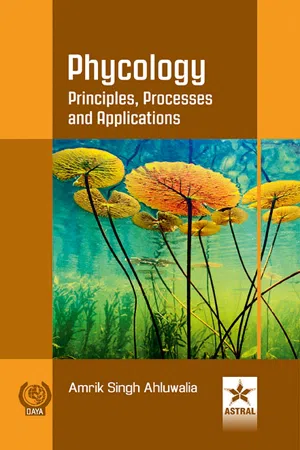
- English
- PDF
- Available on iOS & Android
Phycology: Principles, Processes and Applications
About this book
Time seems ripe for the application of phycological research in various disciplines of biology. Algal organisms, due to their small size, wider distributional pattern, a short life span, easily manipulative inorganic nutrition, and other useful attributes, have attracted developmental biologists, geneticists, biotechnologists, microbiologists, physiologists, environmentalists, zoologists and forensic scientists alike. These organisms have a wide range of application in a spectrum of areas comprising agriculture, aquaculture, environment and in a variety of industrial and food products. This book Phycology: Principles, Processes and Applications, provides comprehensive updated reviews on several important aspects of phycology. The volume comprises of 24 chapters, which are grouped in five sections. The chapters cover a variety of topics ranging from systematics and ultrastructure, physiology and ecology, molecular biology and biotechnology, an applications. Towards an end, few chapters on methods and techniques are of special interest to the budding phycologists.
Tools to learn more effectively

Saving Books

Keyword Search

Annotating Text

Listen to it instead
Information
Table of contents
- Preface
- List of Contributors
- Mohinder Singh Randhawa: A Multifaceted Personality
- SECTION I: FLORISTICS, PHYLOGENY AND ULTRASTRUCTURE
- 1. Classification and Phylogeny of Chlorophyta
- 2. Contribution to the Knowledge of Desmids of Kumaon Himalaya
- 3. Diversity of Algal Flora in Relation to Major Crops, Source of Water, Soil Types and Fertilizers in Cultivated Soils of Bidar and Gulbarga Districts, Karnataka, India
- 4. Current Status of Azolla Lam. Taxonomy
- SECTION II: PHYSIOLOGY, BIOCHEMISTRY AND ECOLOGY
- 5. Nitrogen Metabolism in Cyanobacteria
- 6. Impact of Cu, Zn and Cd on Certain Physiological and Biochemical Characteristics of Microcystis sp.
- 7. UV Absorbing Pigments in Epilithic Cyanobacteria Occurring on the Temples and Monuments
- 8. Influence of Petroleum Oils on Algae and Cyanobacteria
- 9. Algal Protein: Functional Properties and Potential for Food Applications
- 10. Role of Magnesium and Phosphate Limitations and Low Temperature in Stimulating Algicide Production in a Cyanobacterium, Oscillatoria laetevirens
- 11. Contributions to the Understanding of Nitrogen Fixation and Nitrogenase Regulation in Cyanobacteria by Indian Scientists
- 12. Biochemical and Ultrastructural Studies on the Effect of Different Light Intensities on Hypnea musciformis and H. valentiae from Rameswaram Coast
- 13. Symbiotic Association of N2 – Fixing Cyanobacterium Anabaena azollae in Aquatic Water Fern Azolla
- 14. Akinetes: Structure, Differentiation and Germination
- SECTION III: MOLECULAR BIOLOGY AND BIOTECHNOLOGY
- 15. Molecular Profiling and Genetic Transformation of Cyanobacteria: Current Status and Prospects
- 16. Production of Transgenic Cyanobacteria and Their Applications
- SECTION IV: APPLICATIONS OF ALGAE
- 17. Role of Algae in Sustainable Aquaculture
- 18. Lipids from Micro-algae
- 19. Seaweed Utilization: A Review
- 20. Spirulina in Modern Industries for Manufacturing Value Added Dietary Packages
- 21. Nitrogen-fixing Capacity of Some Selected BGA Isolated from the Rice Field Soils of North Eastern India
- SECTION V: CULTURE METHODS AND TECHNIQUES
- 22. Culture and Cultivation of Marine Algae
- 23. Transmission Electron Microscopy with Energy Dispersive X-ray Micro Analysis: Principle and Techniques on Macroalgae
- 24. Photobioreactors for Culture of Arthrospira and Other Microalgae
- Index
Frequently asked questions
- Essential is ideal for learners and professionals who enjoy exploring a wide range of subjects. Access the Essential Library with 800,000+ trusted titles and best-sellers across business, personal growth, and the humanities. Includes unlimited reading time and Standard Read Aloud voice.
- Complete: Perfect for advanced learners and researchers needing full, unrestricted access. Unlock 1.4M+ books across hundreds of subjects, including academic and specialized titles. The Complete Plan also includes advanced features like Premium Read Aloud and Research Assistant.
Please note we cannot support devices running on iOS 13 and Android 7 or earlier. Learn more about using the app